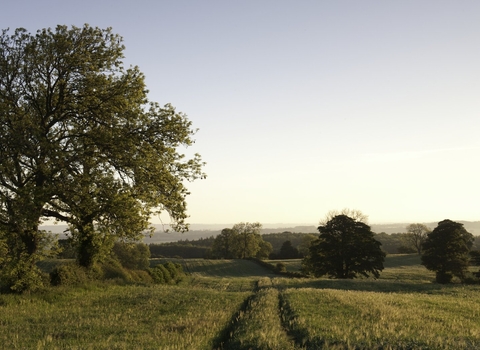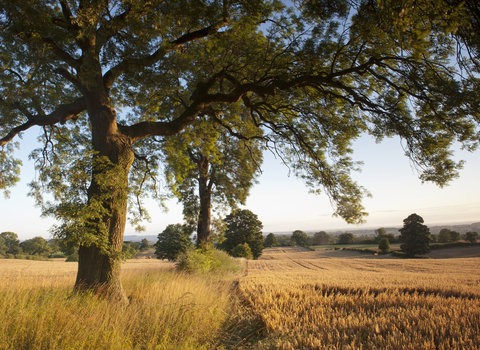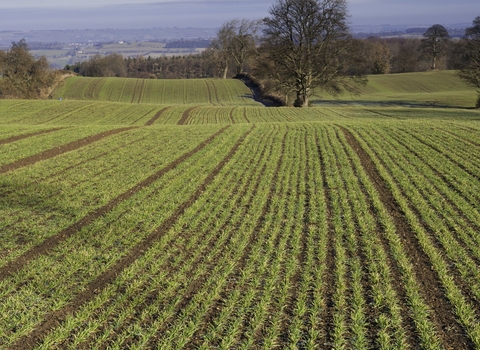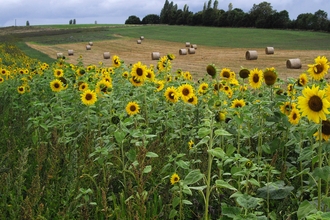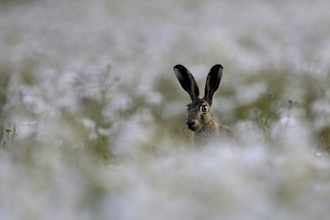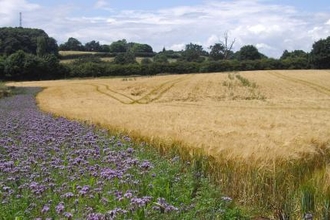Restoring wildlife and the natural world includes allowing gardens to grow wilder, greening cities, and ensuring nature reserves can flourish. But the way our food is grown and how our fields are farmed also has a huge impact on the natural world.
Did you know that around 70% of UK land is used for agriculture?
By shifting away from intensive agricultural practices and towards regenerative, nature-friendly methods, farming has huge potential to help nature recover.
In turn, global food production is reliant on thriving natural systems to provide healthy soils, safe and plentiful water, beneficial pollinators, and a stable climate.
Climate change is already damaging UK food production. The health of our soil is decreasing, limiting the amount of food which can be grown, whilst warmer winters are increasing the spread of crop diseases.
Nature-friendly farming is the answer to these growing threats.
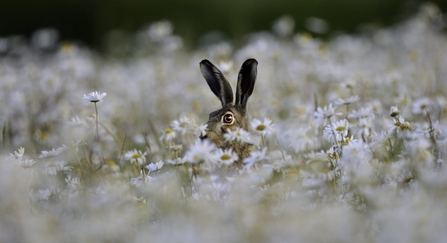
David Tipling/2020VISION
We need to help farmers help nature
The Environmental Land Management schemes, referred to as ‘ELMs’, are the new post-Brexit funding schemes for farmers and land managers in England. If these schemes are designed and delivered correctly, ELMs could be a valuable tool for promoting more nature-friendly farming, which would help to halt wildlife declines and bring nature back across the UK.
Transitioning to more nature-friendly farming would not only be good for nature, but it could also help farmers to increase their profits and boost farm resilience to threats like climate change. However, the ELMs schemes are still in the early stages of development and rollout, so it is vital we continue to push for them to be ambitious, properly funded, and effective at bringing about nature’s recovery.
What support do farmers need?
The Wildlife Trusts believe the Environmental Land Management schemes (ELMs) and wider agricultural policy must prepare us for the crises of the 21st century – the rising cost of living, climate change, and nature loss. We want to see:
-
Farm payment schemes which go further and faster in supporting farmers to bring nature back into their farm businesses.
-
Policy changes that help to end the dependency on pesticides and artificial fertilisers.
-
Stronger safeguards to reduce pollution in our waterways. Pollution from farming is responsible for 40% of England's waters to fail quality standards.
-
Evidence that farming policies will deliver against the Government’s environmental targets. This includes a legal requirement to halt the decline of nature by 2030, a target to reach net zero by 2050, and the newly signed Kunming-Montreal Global Biodiversity Framework that stipulates 30% of land and sea must be protected for nature by 2030.
What can I do?
We need to show the UK Government that there is overwhelming public support for nature-friendly farming.
Sign up to be a nature-friendly farming champion
By signing up, we’ll keep you updated with all the latest campaign news, and we’ll send you resources to support you to champion nature-friendly farming in your local area.
Can’t wait to get started? Check out our guidance for contacting your MP below.
Show your support for nature-friendly farming by getting in touch with your MP. You can send an email or write a letter. If you have the time, the best thing you can do is speak with your MP over the phone or meet them in person. If you’re tight on time but want to make a difference, you can tweet your MP.
What to say to MPs?
Talking points
Whether you write to your MP, talk to them over the phone or meet them in person, it’s important to be clear about what your concerns are, and what you are asking them to do about it.
It’s best to put your concerns into your own words. Talk about why this issue matters to you. For example, you might miss hearing skylarks regularly or you might have noticed the huge decline of insects over your lifetime. Share your story: MPs love personal stories from constituents.
Talk about why you are concerned about the key issues, including:
-
Biodiversity loss and climate change are the biggest medium and long terms threats to UK food production.
-
There is no such thing as food security if nature is in decline.
-
The UK Government needs to ensure its farming reforms deliver for the environment as promised.
-
The UK Government must ensure that ELMs pays good rates for ambitious and effective nature-friendly farming practices.
Once you have explained what your concerns are, you need to give your MP a clear ask of what you want them to do. The Wildlife Trusts recommend:
-
Ask them to read The Wildlife Trusts MP briefing. It provides more detail on the issues, relevant Government policies and our recommendations. It is short, simple and gives them the key information they need to feel confident asking about the subject. Download it here.
-
Ask them to speak out in support of nature-friendly farming, in the House of Commons and in writing.
-
MPs can ask a question in the House of Commons
-
MPs can write to the Secretary of State for Environment, Food and Rural Affairs, Steve Barclay, with their concerns and questions
-
We want them to ask for assurance from the Government that ELM will deliver on the Government’s environmental targets and doesn’t only fund business as usual. They need to ask for assurance that ELM contains ambitious standards that will deliver for people and nature.
-
Encourage them to talk to local farmers about the support they need to take up nature-friendly methods.
How do I write to my MP?
You can email or write a letter to your MP.
To find out who your MP is, and see their contact details, search your postcode using the link below.
MPs are very busy people, so don't be offended if they don't get back to you straight away.
How do I meet with my MP?
Your best option for meeting your MP is to ask to meet them in your constituency. You may find it easiest to meet them during one of their constituency surgeries. This is when your MP meets their constituents to talk about things affecting them and for people to raise concerns about politics or local issues. They are even more likely to be able to meet with you while parliament is in recess.
The first step for organising a meeting is to contact them or the people who work in their constituency office. Arrange a meeting with your MP by sending them a postcard today using our simple tool.
Send your MP a posctard invitation
The postcard will land on the doormat in their office, and they’ll be back in touch to find a suitable time for you to meet.
By speaking face to face with your MP, you can have a huge impact.
Or if you'd prefer to contact your MP yourself, you can find out who your MP is and their contact details by using this tool:
When you ask for a meeting, explain what you want to meet your MP about and offer some time(s) and date(s) you’d like to meet. You may have to be flexible about meeting - MPs often have very full diaries but should make time for everyone. MPs often spend Fridays in their constituencies, so this may be a good day to organise a meeting.
Don't forget to put your full postal address on anything you write to your MP so they know you live in their constituency.
If you have a friend or family member in the same constituency who also cares about nature-friendly farming, you could bring them along so you’re not on your own.
How can I make my meeting effective?
MPs want to hear from you, but they are pressed for time so don't expect meetings to last too long. Generally, appointments will last around 10-15 minutes – it helps to have your key messages ready.
Watch this recording of a workshop ran by our Campaigns Officer Chris coverying everything you need to know, from practical steps to how to be persuasive. By the end of the recording, you'll feel ready to talk to your MP.
You might find it helpful to prepare in advance and perhaps even rehearse what you want to say beforehand. It's also important to research who your MP is. Find out what they care about and whether or not they have taken an active interest in the environment before - that way you can go into the meeting fully prepared. You can find a lot of that information using TheyWorkForYou.
Share your story:
MPs love personal stories. Share yours with them. You don’t need to be an expert; you just need to tell them why you care about nature-friendly farming.
Have a clear ask:
To make your meeting as successful as possible, make sure you know what you're asking your MP to do.
The key Wildlife Trust recommendations are:
-
Farm payment schemes which go further and faster in supporting farmers to bring nature back into their farm businesses.
-
Policy changes that help to end the dependency on pesticides and artificial fertilisers.
-
Stronger safeguards to reduce pollution in our waterways. Pollution from farming is responsible for 40% of England's waters to fail quality standards.
-
Evidence that farming policies will deliver against the Government’s environmental targets. This includes a legal requirement to halt the decline of nature by 2030, a target to reach net zero by 2050, and the newly signed Kunming-Montreal Global Biodiversity Framework that stipulates 30% of land and sea must be protected for nature by 2030.
Don’t worry if you’re not an expert:
It’s your MP’s job to listen to you and you will probably know far more than them - just be passionate about the issue.
Take a photo:
Ask your MP if you can take a photo with them - this is a great way to let others know that people have been speaking to them about nature’s recovery, and to encourage them to do the same. MPs often like the publicity too!
Let us know if you hear back from your MP
We’d love to hear if your MP replies to you or if you manage to meet them. Let us know by emailing us at campaigning@wildlifetrusts.org
“For decades, the choice between food or nature has been presented as binary, with the two competing demands for land often seen as at odds with each other. However, this could not be further from the truth. The main threats to food security in the UK are climate change and ecological breakdown, and so nature’s recovery is critical to underpinning resilient and profitable food systems.”Chief Executive, The Wildlife Trusts

